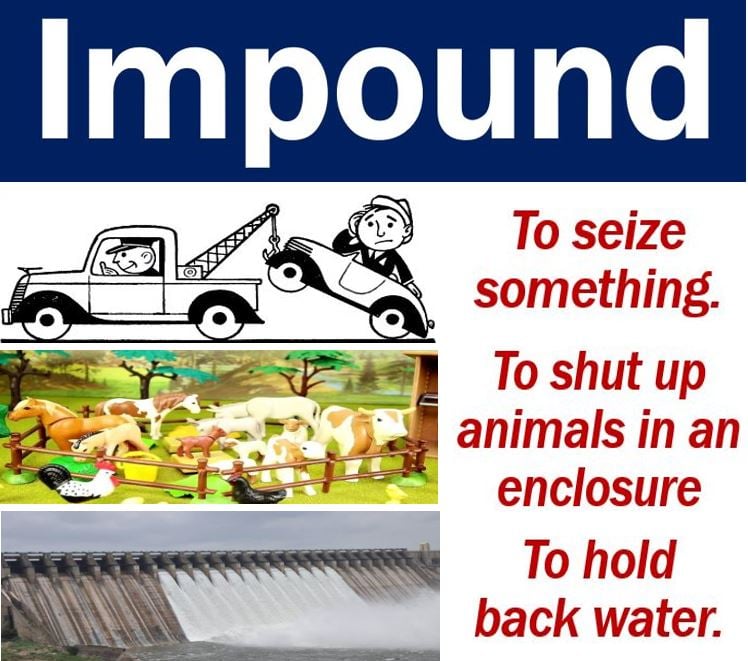To impound is to take legal custody of something, i.e., to seize it from the owner. In most cases, there is an understanding that the owner will get it back. As a verb, to impound means to seize somebody’s possession such as documents, goods, or a vehicle, because of an infringement of the law.
If the police impound something, it means they have taken it away because the owner has broken the law. They may also have taken it away because they need it as evidence in an investigation.
An impound account is a type of account that mortgage companies keep (see last part of this article). The term may also mean to shut up domestic animals in an enclosure or a pound.
If I say “It will impound a reservoir 50 kilometers long,” I am talking about a dam. In this case, the verb means to hold back water, i.e., to contain.
According to the Oxford Living Dictionaries, to ‘impound’ means to:
“1. Seize and take legal custody of (something, especially a vehicle, goods, or documents) because of an infringement of a law. 2. Shut up (domestic animals) in a pound or enclosure. 3. (Of a dam) hold back (water).”

Why impound vehicles?
When somebody seizes and takes legal possession of a vehicle, we call it ‘vehicle impoundment.’
It is the legal process of placing a vehicle in a tow yard or impoundment yard. It is a holding place for vehicles until their owners regain control of them.
If the owner does not get the vehicle back, it either ends up in auction or at a wrecking yard.
In most cases, the police impound the vehicle. However, sometimes it may be an impounding agency.
There are several reasons for impounding a car:
- There are parking violations that the owner has not paid for or resolved. In some municipalities, there is a fine threshold. If a vehicle exceeds that threshold, the municipality impounds it.
- If the owner parked the car in a no-parking area with a ‘tow away‘ warning.
- The owner of the car has moving violations that he or she has not resolved.
- The police need the vehicle as evidence in their investigation of a potential crime.
Impound – mortgage company account
Mortgage companies have accounts to collect payments that mortgage holders have to make.
Hazard insurance, for example, as well as private mortgage insurance and property taxes are some of these payments. A mortgage is a loan to a purchaser of a house or other real estate.
We call this type of account an impound account.
Although they are not part of the mortgage, the borrower has to make these payments to keep the property.
Many lenders require borrowers who put down less than 20% to have this type of account. As far as the lender is concerned, a low-deposit borrower is a higher risk than a high-deposit one.
Therefore, it is important to make sure that the property has no problems in case the lender has to repossess it.
